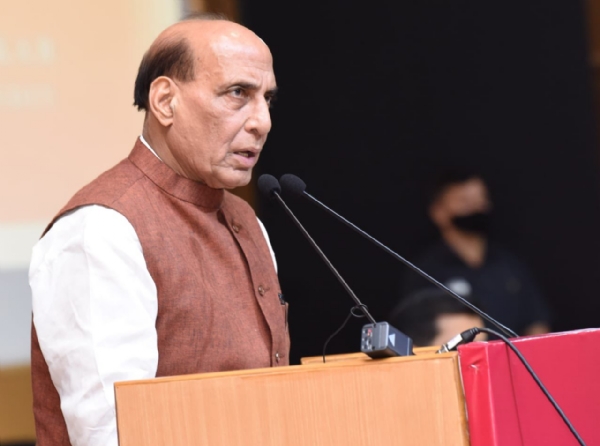'Gandhi asked Savarkar to file mercy plea before British,' says Rajnath Singh; WATCH VIDEO-
Rajnath Singh said, "Lies were spread about Savarkar. Time and again, it was said that he filed mercy petitions before the British government seeking his release from jail. It was Mahatma Gandhi who asked him to file mercy petitions."
Total Views | 213
New Delhi, Oct 13: Noting that there had been "deliberate attempts to defame" Vinayak Damodar Savarkar, Defence Minister Rajnath Singh said that it was on Mahatma Gandhi's request that he wrote mercy petitions to the British.

Singh was speaking at the launch of a book, Veer Savarkar – The Man Who Could Have Prevented Partition authored by Uday Mahurkar and Chirayu Pandit. Referring to the controversy about Savarkar’s mercy petitions to the British while he was serving a life sentence in Andaman in the 1910s, the minister said, "Lies were spread about Savarkar. Time and again, it was said that he filed mercy petitions before the British government seeking his release from jail. It was Mahatma Gandhi who asked him to file mercy petitions."
He also said that Rashtriya Swayamsevak Sangh (RSS) ideologue presented India with a "robust defence and diplomatic doctrine" and was India’s biggest and first defence and strategic affairs expert in the 20th century. The minister also said people who followed Marxist and Leninist ideologies accused Savarkar of being a fascist and proponent of Hindutva.
"He was very forthright in saying that India’s relations with other countries should depend on how conducive they are to our security and National interests. He was clear that it did not matter what kind of government there was (in the other country) but what mattered was that country will remain a friend as long as it remained conducive to our interests," Singh said.
Also Read: Mahurkar's Book, Savarkar's Truth! RSS' Mohan Bhagwat takes on conspiracy to defame Veer Savarkar
The minister said a campaign was unleashed to discredit him. "He was a freedom fighter and there are no two ways about it. It is not forgivable to paint him otherwise," he added. RSS chief Mohan Bhagwat, Union Ministers Gen VK Singh (retd), Jitendra Singh, Parshottam Rupala and Arjun Ram Meghwal were among those present at the event.
Bhagwat, who also spoke on the occasion, said those who did not understand the multi-dimensional personality of Savarkar discredited him. He said Savarkar’s ideology was congruent to the idea of being able to walk together and speak in one voice even in the face of divergent political ideologies.
"We believe that political difference of opinion exist and it is natural. (Mahatma) Gandhi and Savarkar had differences of opinion, no attempts should be made to disprove that…but their feelings towards each other were similar to those of compatriots who work selflessly," he said. He also sought to stress on Savarkar’s idea of inclusivity, which was reflected in his acceptance of ideological differences and following different faiths. "There is absence of correct information about Savarkar. The campaign to discredit him was started soon after Independence," he said.





